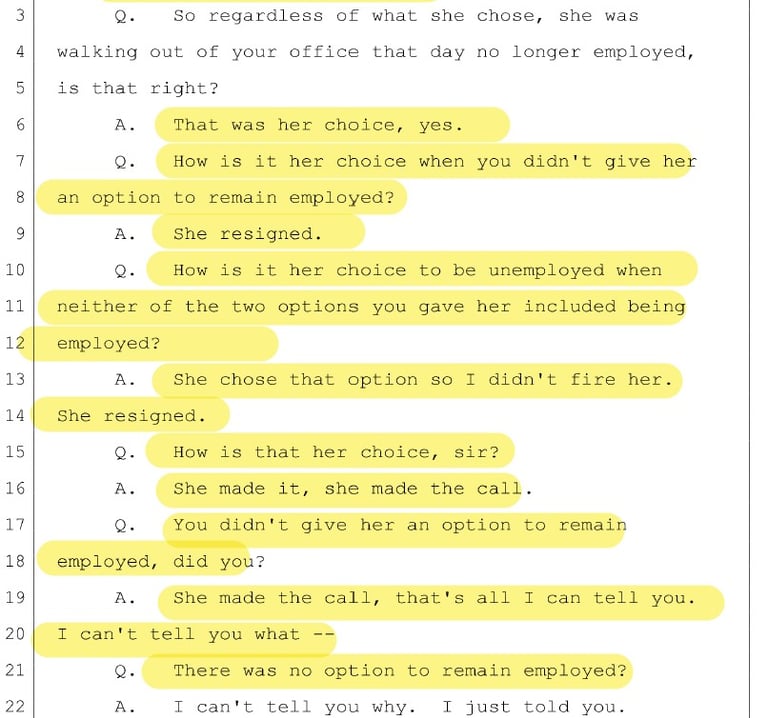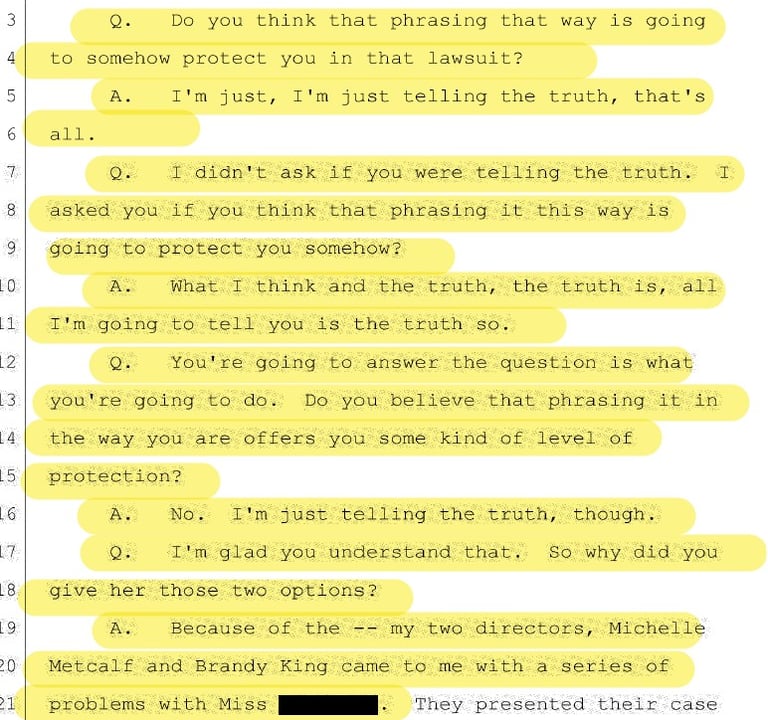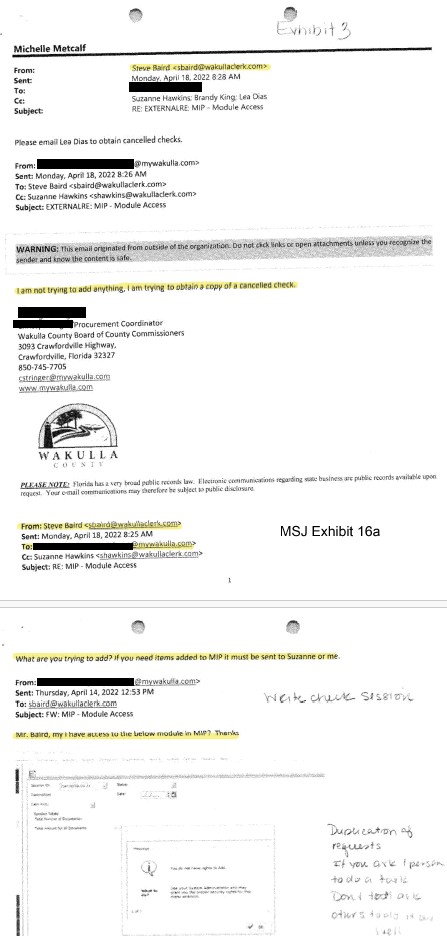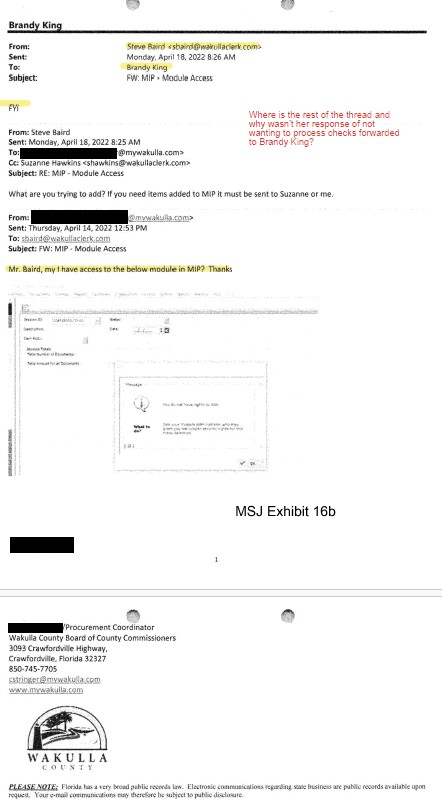$165K Fact Payout: Unraveling one of the Wakulla County Employment Law Cases - Part 2
A brief look at the County Administrator's deposition in this case and a few of the emails provided as exhibits. The volume will warrant a Rumble video to follow.
MONEY & FINANCE
1/11/20254 min read


Deposition/Email Findings and Their Implications
The recent employment law case in Wakulla County, which resulted in a $165 fact payout, has raised numerous questions regarding the handling of employee discipline and the implications of proper documentation. As we delve deeper into the case, we unveil additional documents that provide clarity on the proceedings and the underlying issues.
The depositions and associated emails related to this case have shed light on what transpired leading to the payout. These documents reveal insights into decision-making processes within the county's administration. Interestingly, some staff members recommended that the plaintiff receive a lighter disciplinary action in lieu of termination. This raises essential questions about the consistency and fairness of disciplinary actions enforced within the county's employment practices.
SOURCE DOCUMENTS CAN BE FOUND HERE (look for "Deposition" in the file description)
Could This Case Have Been Avoided?
With the evidence presented through these documents, one can’t help but ponder whether this situation could have been averted with more rigorous documentation and policy (or lack thereof) enforcement. The lack of clear communication and inadequate documentation can often lead to misunderstandings that escalate into legal challenges. Proper documentation not only aids in transparent decision-making but also serves as a safeguard against potential disputes, ensuring that our tax dollars are only expended as necessary for the efficient operation of our county.




Summarizing Hundreds of Pages of Deposition
In reviewing the extensive deposition documents over several days, we have compiled and redacted copies for your examination. While we have taken diligent measures to safeguard the plaintiff's identity, it is important to acknowledge that we may not catch every detail that could potentially reveal personal information. These documents are part of the public record, intended solely to provide transparency regarding the proceedings without compromising the privacy of individuals involved. Our commitment remains focused on the broader context of the case rather than the specific identities of those engaging with our civic institutions. We appreciate your understanding as we navigate the complexities of attempting to provide confidentiality while fulfilling our obligations to public accountability. The source documents can be found here as well as electronically on the Clerk of Court website or by conducting a public records request.
Summarizing Hundreds of Pages of Deposition
In reviewing the extensive deposition documents over several days, we have compiled and redacted copies for your examination. While we have taken diligent measures to safeguard the plaintiff's identity, it is important to acknowledge that we may not catch every detail that could potentially reveal personal information. These documents are part of the public record, intended solely to provide transparency regarding the proceedings without compromising the privacy of individuals involved. Our commitment remains focused on the broader context of the case rather than the specific identities of those engaging with our civic institutions. We appreciate your understanding as we navigate the complexities of attempting to provide confidentiality while fulfilling our obligations to public accountability. The source documents can be found here as well as electronically on the Clerk of Court website or by conducting a public records request.




*** It should be noted in the above email thread that the secondary email shows that the finance director did not forward the entire email chain to King which would've reflected her request amendment that she did not need to write checks, she simply needed to see the canceled checks.
During the evaluation of Edwards' testimony, it became evident that he tended to provide vague answers or evade questions unless pressed by the plaintiff's attorney. Notably, he struggled to recall details about what he had reviewed prior to the termination decision. He staunchly insisted that the plaintiff was presented with an option to either be terminated or resign, claiming she was not coerced into resignation. However, when asked if she had the choice to remain employed, Edwards's answer was a clear "no." Furthermore, he acknowledged that the plaintiff had already been granted access to certain functions within the accounting system. Interestingly, at one point, Edwards referred to the plaintiff's endeavors to gain access as "hacking," which raised questions about the context and severity of how her actions were viewed by Edwards, in contrast to the email documentation provided above.
The administrator argued that the alleged "hacking" attempt represented a serious breach of the established chain of command and internal policy. However, his inability to elucidate the specific policies supposedly violated raised questions about the legitimacy of his claims. It was noted that the plaintiff merely sought access necessary to perform her job effectively, and perception of willful wrongdoing was not supported. Moreover, the administrator failed to identify any specific policy that the plaintiff may have contravened. This lack of detail calls into question the rationale behind any disciplinary measures taken, particularly considering that termination for a first offense without clear justification appears unwarranted, even by the county's own policy.
In Summary
The case at hand is marked by an overwhelming collection of documents, which we have meticulously reviewed. Key evidence includes the relevant testimony on the Mediafire drive, and a Rumble video is available.
To summarize the findings:
The plaintiff had an impeccable personnel record, free from any documented issues prior to requesting access to canceled checks.
The administrator's deposition reveals a troubling tendency to evade accountability regarding the plaintiff's termination.
Adhering to proper documentation practices could have prevented this lawsuit, ultimately preserving taxpayer dollars, as the community funds the insurance premiums related to this case.
The above points raise the question of the true nature of the county's reason for terminating the plaintiff, as she raised several questions concerning how business was conducted by the administration as it pertains to select procurement processes.

Additional Social Links
YouTube is your go-to for short clips, video explainers, and visual breakdowns of how Florida and Wakulla governments really work.
Facebook brings you bite-sized written content, sticky-note facts, and rolling updates you can share and discuss.
Prefer to browse at your own pace?
Bookmark our website and visit anytime for fresh posts, resources, and real-life examples from right here in Wakulla County.
© 2024. All rights reserved.
